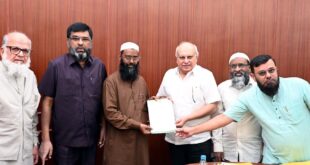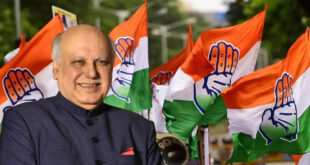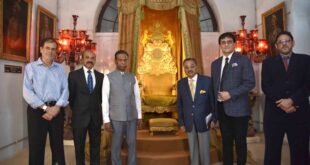By : ASAD MIRZA
For the past one-month or so, since the new Citizenship Amendment Act and NCR and NPR were thrust on the Indian citizens, the country has been waddling in a chakravyuh (maze) of ambiguous promises and statements.
People are demonstrating against the decision due to the ambiguities regarding it and government’s inability to list out comprehensive details of the whole process, in addition to the understanding that the information, which it is seeking, has never been part of the census or any other enumeration in the country, so far.
First, we have to analyse the reasons of the timing of this chakravyuh. Since November, in spite of a pliable media reporting otherwise, the government was staring at a shooting unemployment rate, increasing inflation and worsening law and order besides loss of power in several state elections, due to which it needed a much bigger issue, which could help it to divert public attention from all issues at one go, and let it continue with its decisive machinations.
Secondly, an analysis of the government’s performance since 2014 shows that India, instead of racing towards becoming an economic super power by 2024, as was promised and touted, is not going to achieve that distinction at all. From a double-digit growth in 2014 we have faltered to single digit growth this year, as per RBI reports. Both the RBI and the government now expect GDP growth for the year to be at 5%. The SBI, the country’s largest bank, expects the final growth number to clock in at 4.6%. It also brings the efficacy and functioning of the government and other economic institutions under the lens.
Thirdly, while the ruling class is touting itself to be the champions of the down trodden and planning to bring so-called victims (Hindus) from other neighbouring countries back to India, the Eurasia Group, a consultancy which works with investors and business leaders has placed India at 5th biggest geopolitical risk in 2020, in the world. In its report, prepared under the guidance of political scientist Ian Bremmer, it says the scrapping of Jammu and Kashmir’s special status, the Supreme Court-monitored citizenship verification drive (NRC) in Assam and the 2019 amendment to the Citizenship Act before predicting an increase in ‘sectarian and religious conflict’ all will contribute significantly to India’s performance. The report further says that Prime minister Modi has spent much of his second term promoting controversial social policies at the expense of an economic agenda. The impacts will be felt in 2020, with intensified communal and sectarian instability, as well as foreign policy and economic setbacks.
It seems the CAA-NRC-NPR trio or chakravyuh was a very calculated move, to divert attention from all the screaming issues and instead lead the whole country to a quagmire, emerging out of which will not only drain people of all strength but also their ability or power to question the government. It sought to completely change the narrative building up against it by throwing-up this disruptive law. This disruption will engage a large percentage of Indian population in a completely uncalled for unproductive activity. Common man will be forced to run from pillar to post to arrange documents to prove his domicile, thus wasting many productive man-hours, which could have been utilised productively otherwise. While on the one hand it can’t provide for a large percentage of the population, it’s planning to grant citizenship to non-Indians. Moreover, people assert that if all previous documents like Voters Card, Aadhar Card, PAN card, Passport are not fit enough to prove one’s citizenship, so were we really living in a fool’s paradise for the last 72 years in a this country without any legal standing? Further, if the Voter Card is not a valid ID, then how come this government can claim the seat of power by elections conducted using the same non-valid Voter Card?
To decipher the chakravyuh, you’ll have to understand the chronology. It’s originator was Bhisham Pitamah AB Vajpayee, who initiated this move in 2003 through the Citizenship Amendment 2003. It then prescribed the creation of an NRIC-National Register of Indian Citizens as an instrument to identify ‘illegal immigrants’. But these illegal immigrants were to be identified through the NPR. Thus, contrary to continuous denials by the authorities, NPR is the way to fill-up the NRC.
Now the Chanakya has further complicated the chakravyuh, as per the subordinate legislation of the Act, rules to identify the illegal immigrants are to be formulated or approved NOT by the Parliament but by the Executive. It further provides that the Registrar General of India, can start compiling a NPR ‘for the purpose of National Register of Indian Citizens’.
The issue is that the rules do not specify which documents are required for establishing citizenship. Local officials are free to adopt erratic standards for different citizens, which could lead to impulsive and focussed targeting of citizens. These powers also practically allow the executive to victimise genuine citizens.
The delegation of such unbridled power to the executive also violates the ‘rule of law’ as per the Constitution, which requires the legislature to provide proper guidance and safeguards for the implementation of laws. Parliament must include clear criteria, standards and principle to the executive to implement the legislation. The stakes of the abuse are high. If the Assam NRC is anything to go by, even the most basic documents may fail to establish citizenship if minor errors creep into them.
Moreover, the most decisive aspect of this decision are the social aspects related to it. BJP and RSS have always advocated a divisive and Hindutva-focussed narrative in the country. The younger generation at the schools has already started experiencing the fall out. Conversations at schools have already started identifying US and THEM, imagine if this happening in elite schools of Delhi, then what would be the reality at the grassroots. In rural areas the right-wing organisations have already started convincing the fence sitters that they’ll have a right to occupy the land and property of the ‘illegal immigrants’. The way this social divide is happening and the changing narrative will yield a very bitter crop, which does not bode well for India.
The Registrar General has already initiated this process through a notification in July 2019. The piloting of the NPR has already begun in Karnataka from January 1. It is due to commence across the country from April 1.
In a parliamentary democracy, responsibility to question the leaders lies on opposition parties too, they should engage with the government in the parliament in a planned and strategic manner and scrutinise and judge its every move using the parliamentary system of checks and balance. Unless all non-BJP governments refuse to implement the NPR, they will be collaborating in a process of targeted mass disenfranchisement of the kind that Nazi Germany witnessed in the grim years leading to the Holocaust. History will find it hard to forgive them.
 Gawah (The Witness) – Latest News, Current Affairs, Politics, Sports, Religion, Literature, Technology, Education, National, Local – Hyderabad Telangana India World Fearless By Birth, Pristine by Choice – First National Urdu Weekly From South India – Latest News, Breaking News, Special Stories, Interviews, Islamic, World, India, National News
Gawah (The Witness) – Latest News, Current Affairs, Politics, Sports, Religion, Literature, Technology, Education, National, Local – Hyderabad Telangana India World Fearless By Birth, Pristine by Choice – First National Urdu Weekly From South India – Latest News, Breaking News, Special Stories, Interviews, Islamic, World, India, National News





